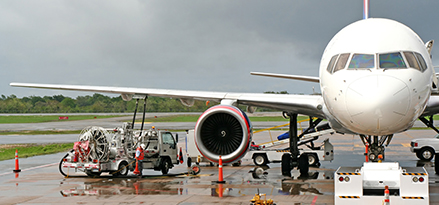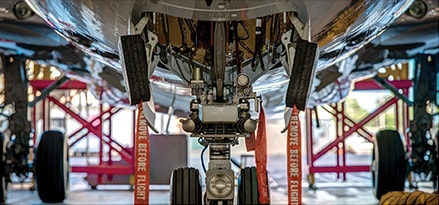The aviation industry’s transition to more sustainable fuel is underway but faces many hurdles. Although some of those hurdles involve policy, the toughest relates to cost-effectively transforming renewable feedstocks into high-quality sustainable aviation fuel (SAF). Fortunately for ExxonMobil, such science and innovation challenges fall squarely in Dan Kadlecek’s wheelhouse. A Houston native who earned his Ph.D. in chemistry at the University of Pennsylvania, Dan has been at the forefront of aviation fuel technology and manufacturing since he joined the company in 2001. In his role as Principal Aviation Fuel Engineer, he advises the corporation on ground-breaking research in both the conventional and alternative aviation fuel space, including SAF, while also providing technical and product integrity guidance on the manufacture, distribution, and use of aviation fuels from the refinery to the wingtip.
Dan recently took some time out of his busy schedule to talk about the evolution of SAF and how ExxonMobil is innovating new approaches to SAF production.
What inspired you to pursue a career in chemistry?
My high school chemistry teacher – I just enjoyed her class. You’d learn the theory about a chemical reaction, but then you’d do an experiment and see, “Oh, that’s what this does. It changes color; or forms a precipitate from simply mixing two liquids…that’s because of the chemistry.” She was also getting her master’s degree while teaching, so that was inspiring. I began my undergrad research career in organic chemistry and then transitioned to inorganic chemistry as a grad student. But in my undergrad and grad schooling, my focus was synthetic chemistry, creating molecules that had never existed.
What prompted you to put your skills and expertise to work for ExxonMobil?
There is a fundamental chemistry aspect to fuels that was, and still is, very interesting to me. It’s understanding how fuels perform in engines and how fuel composition and chemistry changes impact engine performance. And then it was the people I met at ExxonMobil, even during my interview. The work they were doing got me interested in joining the company. There was a passion for excellence that I observed very early on, and that resonated with me.
What sorts of projects were you working on when you first started?
I started in the aviation fuel products group, supporting our global aviation fuel manufacturing and operations. One project was developing data to support eliminating a test from the fuel specification that was no longer relevant, which simplified fuel testing in our refineries. Another focused on fuel filtration at our airport facilities to ensure we maintained fuel quality up to the aircraft’s wing. An important principle of aviation fuel quality control is continuously removing water and dirt that might get into the fuel as it moves through the distribution system. Aviation fuel is therefore filtered regularly to maintain its cleanliness, so we were always looking at ways to improve the technology.
What are some of the factors that have to be considered when developing a new type of aviation fuel?
Every year, millions fly around the world, so safety is of paramount to the industry. As we often say, there are no parking lots in the sky. Therefore, the industry carefully evaluates new fuels through organizations like ASTM International, the preeminent organization for setting fuel manufacturing standards. It took a long time for the industry to accept that synthetic fuels could have the same chemistry and performance as fuels derived from petroleum. Even today, all the SAF produced is required to be a blend of a sustainable component and kerosene derived from crude oil. Feedstocks are also critical to the development of new fuels. While all sustainable fuels are synthetic in the eyes of the aviation industry, not all synthetic fuels are necessarily sustainable. The first synthetic fuels were derived from coal or natural gas, which would not meet today’s sustainability criteria. As the industry transitions to a more sustainable future, biomass is now the preferred feedstock. The industry’s ultimate goal is to develop fuels that look and perform like jet fuel derived from petroleum that are ‘drop-in’, meaning the fuel performs the same without changing aircraft design or operation.
What sparked the aviation industry’s interest in alternatives to petroleum fuels?
The desire to reduce carbon emissions within the transport sector has placed extra focus on the aviation industry since the growth in air travel is expected to be significant over the coming decades. Aviation is also described as being difficult to decarbonize since alternatives like hydrogen and electrification currently have significant technical challenges for an aviation application. So, the focus has been on identifying renewable feedstocks that can be converted into liquid hydrocarbon fuels.
Around the time the industry started considering alternatives, ExxonMobil was chairing the jet fuel committee at ASTM International. Sasol, the South African energy and chemical company, initiated the move to accept synthetic fuels. They provided technical details to justify the use of their fuels derived from coal and natural gas, and the industry agreed that the fuel was acceptable for use in aircraft. Soon after, fuels derived from renewable feedstocks, like vegetable oils and animal fats, were evaluated and again found acceptable. The industry continues to assess dozens of alternative fuels derived from new feedstocks and manufacturing processes. And while combusting these fuels in engines still produces a nearly equivalent amount of carbon dioxide as a jet fuel derived from petroleum, the carbon uptake by the biomass feedstock can greatly offset the net CO2 impact.
In addition to reduced carbon emissions, what are some of the other benefits of sustainable fuels?
Sustainable fuels may offer a higher thermal stability, a crucial property of an aviation fuel. On an aircraft, jet fuel serves as a heat sink, passing through heat exchangers where the fuel absorbs all the heat generated from lubricants and other critical on-board fluids. The fuel actually serves as the coolant. Suppose a fuel can absorb more heat from the oil and other fluids without degrading. In that case, the engines can operate at higher temperatures, which drives efficiency in engine operation and can even lower fuel consumption.
What have been some of the more notable SAF improvements in recent years?
New technologies enable us to process inexpensive feedstocks such as municipal solid waste or agricultural and forestry residues like corn stalks or tree bark. While the initial capital investment requirements are likely costly and the processes for converting these feedstocks into fuel are difficult, we are seeing greater interest in these more abundant feedstock options. Currently, the industry has a good handle on working with simpler feedstocks like used cooking oils and waste animal fats, which look like petroleum in that they are primarily hydrocarbon. They are relatively expensive compared to petroleum but are fairly simple to process into fuels. So, the focus now is looking at some of those next generation technologies that will open up new feedstocks and processes for making SAF.
What is ExxonMobil’s role in the SAF market today?
Over the past year, we have purchased synthetic fuel components from third parties and blended SAF, selling them to our customers to meet their emission reduction goals. At the same time, we’re focusing on identifying easily accessible feedstocks as part of our work to supply low emission fuels. A smart way for us to do that is by using existing refineries and our assets on the ground. To that end, we have also been exploring innovative ways to co-process a wider range of renewable feedstocks in our refineries. Our leadership at ASTM is helping to drive the industry to greater flexibility in how SAF is produced with existing infrastructure.
How do you see ExxonMobil’s role in the SAF market in the next 5-10 years?
A key technology enabler that was discovered and developed by ExxonMobil was the conversion of methanol into fuels. Our Methanol to Jet (MTJ) technology gives us a way to access those hard to convert feedstocks like municipal solid waste and ag/forestry residues as well as atmospheric CO2, which could be used to produce an eFuel when lower-carbon electricity is used as an input. A few technologies today allow you to use these feedstocks, and importantly fewer still address this challenge at scale. Integrating our process technology expertise with fuel manufacturing and logistics advantages, we believe there is an excellent opportunity for us to produce sustainable fuels from these feedstocks at a lower cost than competitive technologies. We've recently announced the MTJ technology publicly, and have begun the ASTM qualification process of evaluating the product as a jet fuel component. Keep in mind though, the aviation industry moves deliberately, so it may take several years to complete the evaluation.
How does policy impact your work developing SAFs?
One of the big challenges in aviation is that the policy to incentivize the manufacture of SAF is lagging the technology. In the U.S., the Inflation Reduction Act includes a number of incentives for sustainable aviation fuels. So, we’re finally starting to see incentives to help offset the cost of manufacturing and reduce the cost to airlines.
At the same time, the Act does not incentivize companies to bring biomass into their refineries and co-process it with petroleum to create a jet fuel that say, 5-20% derived from biomass. These co-processed fuels may have the same net carbon intensity reduction as fuels derived from blending sustainable components at 5-20%, yet have been prohibited from earning any credits, creating a disadvantage for existing refineries that want to contribute to producing more sustainable aviation fuels at scale. Therefore, we continue to work with the industry and legislators to educate them on the benefits of a policy that incentivizes all fuels that can contribute to the emission reduction goals of the industry.
What are your top priorities moving forward?
We have three big areas of focus right now, which tie back to what we’ve discussed. The first is getting technical approval and regulatory incentives for greater flexibility in co-processing, which would enable refineries to use their existing assets to manufacture SAF from a mixture of petroleum and renewable feedstocks. The second is looking at repurposing existing refinery assets to make SAF from refining renewable feedstocks, such as used cooking oil. And the third, is our Methanol to Jet technology. If we can get our methanol conversion technology qualified, any company in our industry can transition to our process and use renewable methanol to produce sustainable jet fuel.
Product:
Fuels
Article Category:
Hear from our experts
Expert:
Dan Kadlecek
Principal Aviation Fuel Engineer at ExxonMobil
Posted:
1/12/2023

